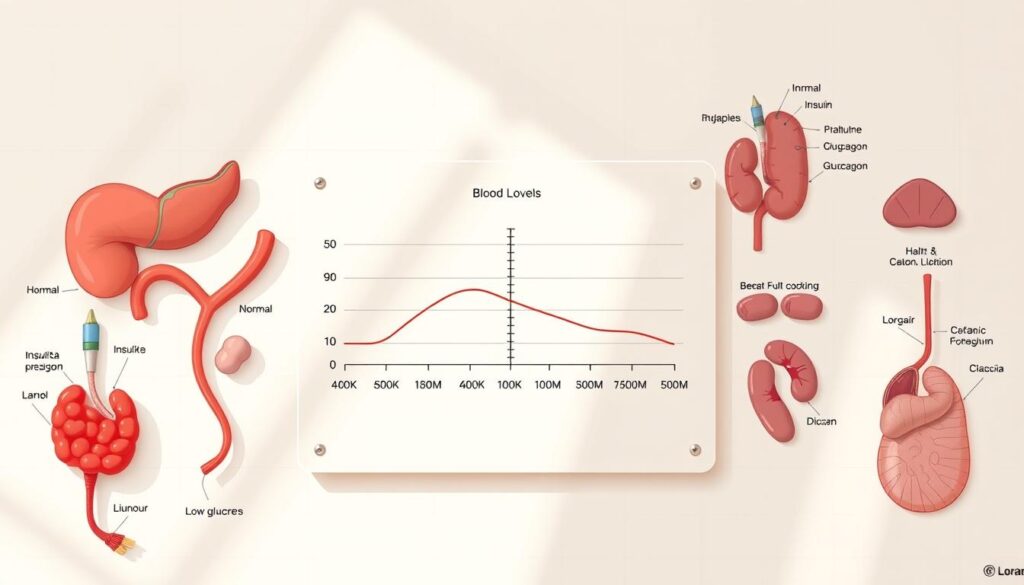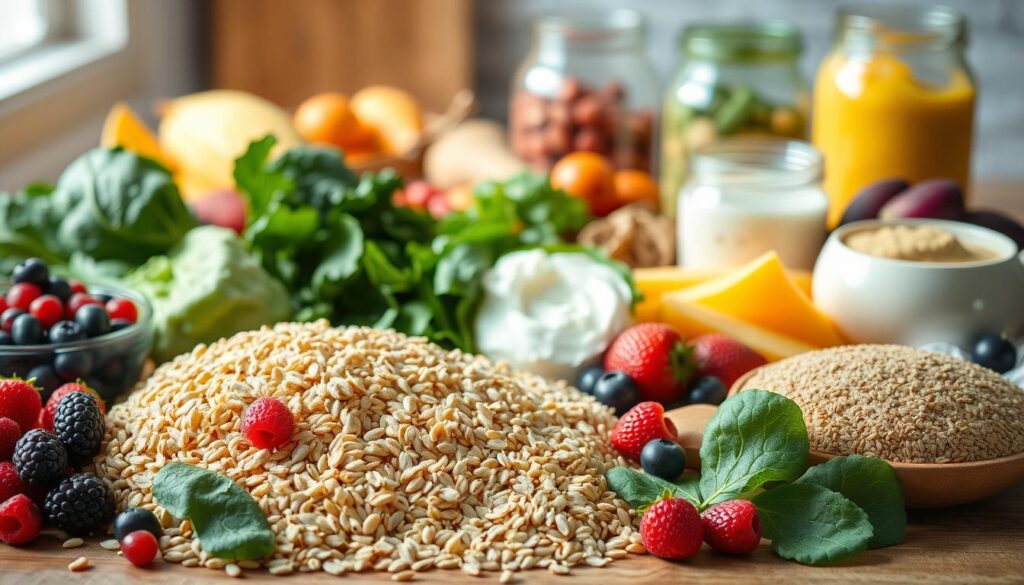In today’s fast-paced world, the focus on maintaining optimal health has never been more critical. One key factor that plays a significant role in overall well-being is glucose control. For many, achieving stable glucose levels is crucial not only for preventing diabetes but also for enhancing energy levels, mood stability, and overall health. As our understanding of the impact of blood sugar levels on our bodies deepens, it becomes clear that taking proactive steps toward managing glucose can lead to profound benefits. Whether you’re looking to reduce your risk of chronic disease or simply want to feel better day-to-day, embarking on a journey to optimal glucose levels is a vital and achievable goal. Join us as we explore practical strategies and lifestyle adjustments that can set you on the path to better health.
Managing blood sugar is crucial for maintaining overall health and energy levels. Your body naturally produces insulin to regulate the sugar in your bloodstream, ensuring everything functions smoothly. However, factors like diet and exercise play a significant role in how well your blood sugar levels are managed. By making informed lifestyle choices, you can prevent complications that arise from high blood sugar and enjoy better health outcomes.
Lifestyle adjustments, such as regular physical activity and a balanced diet rich in fiber, can significantly impact your blood glucose levels. These changes help your body maintain normal blood sugar levels, providing consistent energy throughout the day. Understanding how to implement these changes can empower you to take control of your health proactively.
Key Takeaways
- Optimal blood sugar management is essential for overall health and energy.
- Insulin plays a key role in regulating blood glucose levels.
- Diet and exercise are critical factors in maintaining healthy blood sugar levels.
- Lifestyle changes can prevent complications from high blood sugar.
- Simple, practical steps can help you improve blood glucose management.
Understanding Blood Glucose and Diabetes
Blood glucose, or blood sugar, is the body’s primary energy source, derived from the food we eat. It’s essential for fueling our cells, organs, and bodily functions. Managing blood sugar levels is crucial for maintaining energy and overall health.
What is Blood Glucose?
Blood glucose is the sugar found in your bloodstream. It comes from the food you eat, particularly carbohydrates, which your body breaks down into glucose. This glucose is then absorbed into your blood, providing energy to your cells. When blood sugar levels are balanced, your body functions optimally.
Diabetes and Its Impact on Your Body
Diabetes is a chronic condition where your body either doesn’t produce enough insulin or can’t effectively use the insulin it produces. Insulin is a hormone that helps regulate blood sugar levels. Without proper insulin function, blood glucose can build up in the bloodstream, leading to high blood sugar levels. Over time, this can cause serious health issues, including heart disease, kidney damage, and nerve problems.
Click here for Blood sugar support

Certain foods, especially those high in sugar and refined carbohydrates, can cause blood sugar levels to spike. For someone with diabetes, managing these food choices is vital to maintaining stable blood sugar levels. Without proper management, the risks of complications increase significantly.
Research shows that awareness and early intervention are key to managing diabetes effectively. Studies emphasize the importance of monitoring blood sugar levels and making informed lifestyle choices to prevent long-term health issues. For those at risk of developing diabetes, understanding the role of blood glucose and taking proactive steps can make a significant difference in overall health.
The Importance of Balanced Meals for Blood Sugar Management
Creating balanced meals is key to maintaining stable blood sugar levels. A well-structured meal helps prevent sudden spikes and drops in blood sugar, ensuring your body functions smoothly throughout the day.
Click here for blood sugar support
Role of Carbohydrates, Fiber, and Protein
Carbohydrates break down into sugars, impacting blood sugar levels. However, fiber slows this process, while protein helps stabilize blood sugar. Together, they provide a steady energy release, which is especially important for someone with diabetes.
Smart Swaps and Meal Planning
Simple food swaps can make a big difference. For example, choosing whole grains over refined ones can help manage blood sugar. Planning meals ahead ensures a balanced diet and prevents high blood sugar spikes.
| Food Type | Smart Swap | Benefit |
|---|---|---|
| White Rice | Brown Rice | Higher fiber content |
| White Bread | Whole Grain Bread | Slower sugar release |
| Sugary Snacks | Nuts or Fruits | Stable energy levels |

By incorporating these strategies, you can create meals that support your body’s needs and maintain healthy blood sugar levels.
Lifestyle Adjustments to Support Blood Sugar Stability
Maintaining stable blood sugar levels goes beyond diet; it also involves adopting a healthy lifestyle. Regular physical activity and effective stress management are key components that can significantly impact your overall well-being and blood sugar stability.
Incorporating Regular Exercise
Exercise is a powerful tool for improving insulin sensitivity, which helps your body regulate blood sugar levels more effectively. Activities like brisk walking, swimming, or even light resistance training can make a big difference. These exercises can be done in short sessions throughout the day, fitting into even the busiest schedules.

Research shows that consistent physical activity not only stabilizes blood sugar levels but also enhances overall health. Over time, regular exercise can help maintain a healthy blood sugar range, reducing the risk of complications.
Managing Stress for Better Health
Stress can disrupt blood sugar levels, making management more challenging. Techniques like yoga, meditation, and deep breathing can help keep stress in check. These practices promote relaxation and contribute to stable blood sugar levels.
By combining regular exercise with stress management, you can create a lifestyle that supports long-term blood sugar stability and overall health.
Effective Practices for Glucose Control
Monitoring your blood glucose levels is a cornerstone of effective glucose control. By keeping track of your numbers, you can make informed decisions to maintain stable sugar levels throughout the day.
Monitoring Blood Glucose with Meters and CGMs
Traditional blood glucose meters are a common way to measure your sugar levels. They provide instant results, helping you understand how different factors affect your blood glucose. Continuous Glucose Monitors (CGMs) offer real-time tracking, giving you a more comprehensive view of your trends throughout the day and night.

Adjusting Lifestyle Based on Data
Understanding your target numbers is crucial. Health experts recommend keeping blood glucose levels before meals below 130 mg/dL and after meals below 180 mg/dL. By tracking your trends, you can identify patterns and adjust your meals and physical activity accordingly. For example, if your numbers are high after dinner, consider smaller portions or a brisk evening walk.
- If your blood glucose level is high in the morning, check your dinner portions and consider a light exercise before bed.
- Low pre-lunch numbers might mean you can enjoy a balanced meal without worrying about spikes.
Research shows that tracking your numbers leads to better long-term glucose control. By staying proactive, you can maintain stable blood sugar levels and enjoy improved health.
Managing Your Carb Intake and Digestion
Carbohydrates play a significant role in how your body manages blood sugar levels. Foods high in carbs can cause quick spikes, making it harder to maintain stable levels. By understanding how carbs affect your body, you can make better dietary choices.
Low-Carb Diet Strategies
A low-carb diet can help balance your body’s insulin response. The American Diabetes Association suggests that reducing carb intake can prevent hyperglycemia. This approach is backed by studies showing improved blood sugar stability.
Using a blood glucose meter is a practical way to track how different carb portions affect your levels. For example, if your blood sugar is high after a meal, you might adjust your carb intake next time. This proactive approach helps maintain stable levels throughout the day.
Insulin plays a key role in managing blood sugar. When you eat carb-rich foods, your body releases more insulin to process the sugar. Over time, this can lead to insulin resistance. Moderating carb intake helps keep insulin levels balanced, reducing the risk of complications.
Choosing low-carb alternatives can benefit digestion and blood sugar stability. Opt for vegetables like broccoli or cauliflower instead of high-carb options. Incorporating lean proteins and healthy fats also supports balanced digestion and energy levels.

Eating for Better Blood Sugar: Fiber and Probiotics
Your diet plays a crucial role in maintaining healthy blood sugar levels. Incorporating high-fiber foods and probiotic-rich options can significantly impact your blood sugar stability.
Choosing High-Fiber Foods
Fiber is a powerful ally in managing blood sugar. It slows the release of sugar into the bloodstream, preventing sharp spikes. Foods high in fiber, such as oats, barley, and vegetables, help maintain a steady blood sugar level throughout the day.
The Role of Probiotics
Probiotics support gut health, which is closely linked to blood sugar management. A healthy gut microbiome improves insulin sensitivity, helping your body regulate blood sugar more effectively. Yogurt, kefir, and fermented vegetables are excellent sources of probiotics.
| Food Type | Fiber/Probiotic Benefit |
|---|---|
| Oats | High in soluble fiber, slows sugar absorption |
| Whole Wheat | Rich in insoluble fiber, supports digestion |
| Yogurt | Contains probiotics for gut health |
| Broccoli | High in fiber and vitamins |
| Almonds | Good source of healthy fats and fiber |

Incorporating these foods into your meals can help maintain a steady sugar meter reading. Start your day with oatmeal, add broccoli to your lunch, and enjoy yogurt as a snack. These small changes can make a big difference in your blood sugar stability.
.
Hydration and Its Role in Blood Sugar Balance
Staying hydrated is a simple yet powerful way to support your body’s ability to manage blood sugar levels. Water helps your kidneys flush out excess sugar, preventing it from building up in your bloodstream. Even mild dehydration can disrupt blood sugar balance, making it harder to maintain stable levels throughout the day.
Drinking water regularly not only prevents dehydration but also aids in removing excess glucose from your body. Research shows that adequate water intake can reduce blood sugar spikes. For example, a study found that people who drank more water throughout the day had lower average blood sugar levels compared to those who drank less.
- Set reminders on your phone to drink water at specific times of the day.
- Carry a reusable water bottle to track your intake easily.
- Incorporate zero-calorie drinks like herbal teas or seltzer water into your diet to stay hydrated without adding calories.
A balanced diet that includes plenty of water and low-calorie drinks supports overall wellness and helps maintain accurate glucose meter readings. By making hydration a priority, you’re taking a proactive step toward better blood sugar balance and overall metabolic health.

Portion Management for Maintaining Energy Levels
Managing portion sizes is essential for maintaining steady energy levels and balanced blood sugar. Research shows that eating the right amounts helps prevent calorie overload and energy dips, which can significantly affect blood sugar stability.
The American Diabetes Association emphasizes portion control as a key strategy for blood sugar management. Their guidelines suggest using measuring cups or a food scale to accurately assess serving sizes. This approach helps avoid overeating and maintains energy levels throughout the day.
- Use smaller plates to visually manage portions.
- Measure foods like rice, pasta, and proteins to stay within recommended serving sizes.
- Keep a food journal to track your intake and identify patterns.
Even small changes in serving sizes can affect blood sugar levels and overall metabolic health. For example, reducing carb portions can help stabilize blood sugar and prevent energy crashes. The diabetes association recommends adjusting portions based on individual needs and activity levels.
Portion management is not about deprivation; it’s about balance and awareness.
Tracking your food portions helps you understand how they affect your energy and blood sugar. By staying mindful of what you eat, you can make informed choices that support your health goals. Remember, it’s the small, consistent changes that lead to long-term success.

Weight Management as a Key to Blood Sugar Regulation
Maintaining a healthy weight is a cornerstone of effective blood sugar management. Even small changes in weight can have a significant impact on your overall health and energy levels.
Benefits of Losing 5% of Body Weight
Losing just 5% of your body weight can lead to noticeable improvements in blood sugar levels. Studies show that this modest weight loss can enhance insulin sensitivity and lower the risk of developing type 2 diabetes. For example, if you weigh 200 pounds, losing just 10 pounds can make a big difference in your health metrics, including HbA1c levels.
Tracking Your Progress Over Time
Regular monitoring is essential to understanding how your weight management efforts are affecting your blood sugar levels. Consider using a food diary or a mobile app to track your daily intake and physical activity. By keeping a record, you can identify patterns and make informed adjustments to your lifestyle.
- Measure your weight weekly to monitor progress.
- Track your food intake to stay aware of portion sizes.
- Record your physical activity to ensure consistent exercise habits.
Even minute changes in your daily routine can add up over time. For instance, taking a short walk after meals or choosing smaller portions can help support your weight management goals. These small adjustments can lead to significant improvements in your blood sugar levels and overall health.
Research indicates that hormone balance plays a crucial role in weight management and blood sugar regulation. By maintaining a healthy weight, you can improve your body’s metabolic function, reducing the risk of chronic disease. For patients with diabetes, even a small amount of weight loss can lead to better insulin sensitivity and more stable blood sugar levels.
Remember, weight management is not just about the number on the scale. It’s about adopting a lifestyle that supports your long-term health and well-being. By focusing on gradual, sustainable changes, you can achieve and maintain a healthy weight, improving your blood sugar regulation and reducing the risk of complications associated with chronic disease.

Nutrient Focus: Chromium, Magnesium, and More
When it comes to managing blood sugar, certain nutrients play a vital role. Chromium and magnesium are two essential minerals that can significantly impact your body’s ability to regulate energy levels and support overall metabolic health.
Chromium-Rich Foods for Better Metabolism
Chromium is a mineral that enhances insulin action, helping your body process sugar more efficiently. Foods rich in chromium include broccoli, whole grains, and lean meats. Incorporating these into your lifestyle can improve how your body handles blood sugar, providing steady energy levels throughout the day.
Magnesium and Its Impact on Glucose Levels
Magnesium plays a crucial role in glucose metabolism and insulin function. It helps cells respond effectively to insulin, reducing the risk of insulin resistance. Dark leafy greens like spinach and almonds are excellent sources of magnesium, making them a great addition to your diet for better blood sugar stability.
- Incorporate chromium-rich foods like broccoli and whole grains into your meals.
- Add magnesium sources such as spinach and almonds to your diet.
By tracking the changes in your diet, you can notice improvements in your energy levels and blood sugar management. These small adjustments to your lifestyle can lead to significant long-term benefits for your overall health.
Get the best Magnesium supplement here.
Conclusion
In conclusion, achieving optimal blood sugar levels is a multifaceted journey that requires attention to several key factors. A combination of balanced nutrition, regular physical activity, stress management, and consistent monitoring can collectively enhance your overall health and longevity.
Factors such as balanced meals, hydration, and nutrient intake play a significant role in maintaining stable blood sugar levels. Regular monitoring allows you to track the effect of these factors and make informed adjustments. Over time, these gradual changes can have a lasting impact on your health.
Implement the actionable tips discussed, such as portion management and stress reduction, and review your progress regularly. Remember, every small effort contributes to better health and longevity. While change takes time, the positive effects on your blood sugar levels and overall well-being are well worth the effort.
Click here for Blood sugar support
